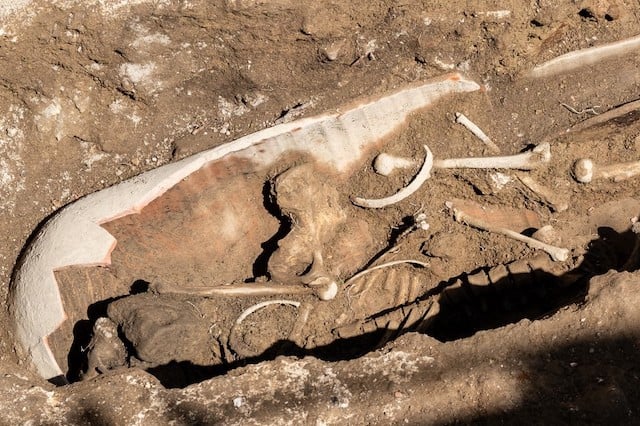Unable to verify their sex, scientists had simply assumed the degraded skeletons belong to a man and a woman, possibly lovers who resided in the north Italian town famous for its vinegar.
But a new technique for analysing protein in tooth enamel has left no doubt that this was a same-sex burial.
Exactly why the two men were carefully laid to rest with their hands interlocked remains a mystery.
READ ALSO:
- A same-sex marriage ceremony in… Renaissance Rome?
- Archaeologists uncover remains of Pompeii victim 'decapitated while trying to flee'
- Four civilizations in Italy that pre-date the Roman Empire
Several of 11 other skeletons unearthed at the same burial site showed signs of violent injury consistent with warfare, according to the study, published in Scientific Reports.
“The two 'lovers' could have been war comrades or friends who died together during a skirmish and were thus buried in the same grave,” University of Bologna professor Frederico Lugli and colleagues speculated.
“Alternatively, the two individuals were relatives — possibly cousins or brothers given their similar ages — sharing the same grave due to their family bond.”
It seems unlikely, they continued, that they were buried as a same-sex couple. “Although we cannot exclude that these two individuals were actually in love, it is unlikely that people who buried them decided to show such a bond by positioning their bodies hand-in-hand,” the researchers concluded.
There are at least half-a-dozen other examples of adults buried with hands intertwined reaching back to Neolithic times 8,000 years ago, but all are thought to be man-and-woman couples.

The so-called Lovers of Mantua, discovered in northern Italy in 2007. Photo: Italian Culture Ministry/AFP
“The discovery of two adult males intentionally buried hand-in-hand may have profound implications for our understanding of funerary practices in Late Antiquity Italy,” the researchers said.
The technique used to distinguish sex is based on a protein, called amelogenin, that is expressed differently in the tooth enamel of men and women.



 Please whitelist us to continue reading.
Please whitelist us to continue reading.
Member comments